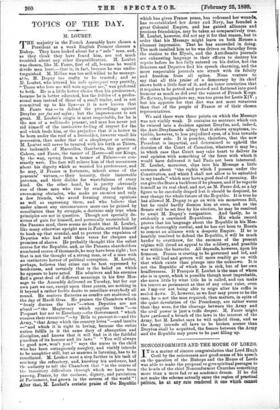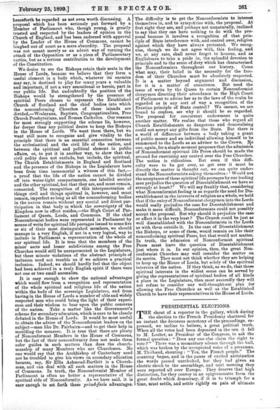NONCONFORMISTS AND THE HOUSE OF LORDS.
IT is a matter of sincere congratulation that Lord Hugh Cecil by the seriousness and good-sense of his speech on the question of the Bishops and the House of Lords was able to make the proposal to give spiritual peerages to the heads of the chief Nonconformist Churches something more than a mere fad or an academic dream. If he did. not make the scheme actually enter the region of practical
politics, he at any rate rendered it one which cannot
henceforth be regarded as not even worth discussing. A proposal which has been seriously put forward by a Member of Parliament who, though young, is greatly trusted and respected by the leaders of opinion in the Church of England, and has been endorsed with approval
by the Leader of the House of Commons. cannot be laughed out of court as a mere absurdity. The proposal was not meant merely as an adroit way of turning the attack of the Opposition or as a piece of Parliamentary tactics, but as a serious contribution to the development of the Constitution.
We desire to see the Bishops retain their seats in the House of Lords, because we believe that they form a useful element in a body which, whatever its enemies may say, is destined to play for many years a valuable and important, if not a very sensational or heroic, part in our public life. But undoubtedly the position of the Bishops would be strengthened by the presence of spiritual Peers chosen to represent the Established Church of Scotland and the chief bodies into which the nonconforming Churches of these islands are divided,—Wesleyans, Baptists, Congregationalists, Free Church Presbyterians, and Roman Catholics. Our reasons for most strongly supporting the scheme lie, however, far deeper than any political desire to keep the Bishops in the House of Lords. We want them there, but we want still more to recognise and give vitality to the principle that there is an essential connection between the ecclesiastical and the civil life of the nation, and between the spiritual and political element in public affairs, or, to put it in another way, to show that the civil polity does not exclude, but include, the spiritual. The Church Establishments in England and Scotland and the presence of the Bishops in the Legislature have been from time immemorial a witness of this fact,— a proof that the life of the nation cannot be divided off into water-tight compartments, one labelled secular and the other spiritual, but that they are, and must remain, connected. The recognition of this interpenetration of things civil and things spiritual is, however, and must remain, imperfect so long as all the nonconforming bodies in the nation remain without any special and direct par- ticipation in that body in which the sovereignty of the Kingdom now in effect resides,—the High Court of Par- liament of Quee'n, Lords, and Commons. If the chief Nonconformist bodies were represented in Parliament by means of writs for spiritual life peerages issued to some five or six of their most distinguished members, we should manage in a very English, if not in a very logical, way to include in Parliament a representation of the whole of our spiritual life. It is true that the members of the minor sects and lesser subdivisions among the Free Churches would still be unrepresented in the Legislature, but these minute violations of the abstract principle of inclusion need not trouble us if we achieve a practical inclusion. Indeed, we should hardly feel that the object had been achieved in a truly English spirit if there were not one or two small anomalies.
It is easy enough to show the national advantages which would flow from a recognition and representation of the whole spiritual and religious life of the nation within the body of the sovereign Legislature, and from having in the House of Lords a number of able and widely respected men who could bring the light of their experi- ence and their wisdom to bear upon the public concerns of the nation. Take a matter like the Government's scheme for secondary education, which is sure to be closely debated in the House of Lords. It would be most useful to obtain the advice of the Nonconformist leaders on the subject—men like Dr. Fairbairn—and to get their help in moulding the measure. It is true that there are plenty of Nonconformist Members in the House of Commons, but the fact of their nonconformity does not make them safer guides in such matters than does the church- manship of many Members who are Churchmen. No one would say that the Archbishop of Canterbury need not be troubled to give his views on secondary education because, say, Sir Ellis Ashmead-Bartlett is a Church. man, and can deal with all such matters in the House of Commons. In truth, the Nonconformist Member of Parliament is often no better a representative of the spiritual side of Nonconformity. As we have said, it is easy enough to set forth these prim/I-facie advantages. The difficulty is to get the Nonconformists to interest themselves in, and to sympathise with, the proposal. At first sight they are, and perhaps not unnaturally, inclined to say that they can have nothing to do with the pro- posal because it involves a recognition of that prin- ciple of State interference with, and control over, religion against which they have always protested. We recog- nise, though we do not agree with, this feeling, and we, at any rate, shall never forget to honour, and as Englishmen to take a pride in, the splendid devotion to principle and to the sense of duty which has characterised the Nonconformists throughout our history. Come what may, their belief in the necessity for the free. dom of their Churches must be absolutely respected. It is a matter beyond argument and discussion, for it is a matter of conscience. But need the issue of writs by the Queen to certain Nonconformist clergymen directing their attendance in the High Court of Parliament to advise her as to the laws of the realm be regarded as in any sort of way a recognition of the Erastian principle of State control ? We cannot, we are bound to confess, see why it should be so regarded. The proposal for concurrent endowment is quite another matter. We realise that those who regard all Church Establishments as dangerous and demoralising could not accept any gifts from the State. But there is a world of difference between a body taking a grant of public money and an individual allowing himself to be summoned to the Lords as an adviser to the Crown.
one, again, for a single moment proposes that the admission of Nonconformist spiritual life Peers should be made the ground for exercising any control over the Free Churches. The notion is ridiculous. But even if this diffi- culty were to be got over, as got over it must be directly the matter is thought out, we can quite under- stand the Nonconformists asking themselves : Would not the acceptance of these spiritual life peerages by our leading men prejudice the question of Disestablishment we have so strongly at heart?' We will say frankly that, considering what Nonconformist feeling is as regards the need for Dis- establishment in the interests of religion as a whole, we hold that if the entry of Nonconformist clergymen into the Lords would really prejudice the case for Disestablishment and make it more difficult, Nonconformists could not possibly accept the proposal. But why should it prejudice the case or affect it in the very least ? The Church could be just as well disestablished with the Nonconformists in the Lords as with them outside it. In the case of Disestablishment the Bishops, or some of them, would remain on like their nonconforming spiritual Peers, but that would not matter. In truth, the admission of Nonconformist spiritual Peers must leave the question of Disestablishment just where it is. In our opinion, then, the great Non. conformist Churches may well consider the matter on its merits. They must not think whether they are helping to keep up the House of Lords, but solely of the spiritual interests of the nation. If they think, as we do, that those spiritual interests in the widest sense can be served by giving the representatives of spiritual bodies of all kinds a place in the Legislature, then most assuredly they will not refuse to consider any well-thought-out plan for allowing the Free Churches as well as the Established Church to have their representatives in the House of Lords.







































 Previous page
Previous page